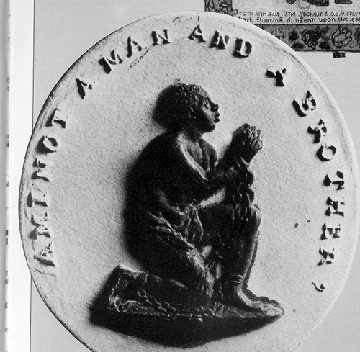

The Anti-Slavery Movement of England began in 1770 with Lord Mansfield's reluctant decision to abolish slavery in Great Britain. In the beginning there was a lot of stubbornness from Parliament to prevent the abolition of slavery. Much of the movement grew out of the number of slaves that were in the West Indies. There was a strong opposition to ending slavery and on May 28th, 1789 West Indian planters, merchants and other creditors came up with nineteen reasons about why abolishing slavery would not be beneficial:
2. slaves purchased by British merchants were prisoners of war or convicted criminals: or they were born slaves or made so for debt.
3. the trade in slaves is the only extensive or advantageous trade possible in Africa: and that the slave trade does not necessarily tend to promote wars or retard the growth of civilization.
4. proprietors have a right to enjoy property legally acquired.
5. the titles to west India property are founded on grants and sales of land by the crown, on royal charters, and acts of parliament.
6. the capital now vested in the sugar colonies, in land, Negroes, building,live and dead stock, amounts to seventy millions of pound sterling.
7. the value of the west Indies depends solely on cultivation, and will be depreciated by any system depriving the proprietors of the means of cultivation.
8. the use of Negroes has been the universal practice from the infancy of the colonies in all the islands, British or foreign.
9. the constitutions of Europeans are equal to agricultural labour in the west Indies.
10. natural causes and accidental calamities make a constant and at times rapid decrease in the number of Negroes, which cannot be guarded against or provided for by births.
11. to depend solely on the internal negroe population for cultivation, is to rest the interests not only of the planters but also of mortgagees, annuitants, femmes couverts, widows, infants, and various other west India creditors, in Britain, on the uncertain issue of an untried speculative experiment, which, if it fails in the ends proposed, must cause great loss if not total ruin, to numbers of innocent individuals, who are purchasers, for a valuable consideration, on the faith of a system long established on the colonies, sanctioned and corroborated by many acts of parliament.
12. the trade to Africa and the British west Indies supports manufactures, shipbuilding, navigation, and revenues; and depends on the continuing cultivation of the west Indies.
13. this was just a list of exports from Africa to the west Indies.
14. this was the value of imports from the west Indies, the tonnage of ships in the west India and Africa trades, the number of seamen employed, and the revenue derived from commercial tariffs.
15. the west India and African trades constitute a nursery for seamen.
16. the French give bounties on shipping and important African labourers.
17. the Spanish opened several ports in south America for the importation of Negroes, duty free, for the encouragement of agriculture in their colonies.
18. the Americans have fitted out several vessels to prosecute this trade.
19. the prime minister's declaration, that no compensation could be paid for abolition, is so repugnant to every principle of justice that it will destroy all faith in royal charters and in parliament. 19
There were many Whites known as abolitionist who were against the institution of slavery. Two of those people key to the eliminating slavery were Granville Sharp and Thomas Clarkson. Together in 1787 they founded the Society for the Abolition of the Slave Trade. To learn more about this movement and the people involved in it click on this web page: http://www.spartacus.schoolnet.co.uk/slavery.htm. To find out more about Lord Mansfield decision click here----Mansfield Case.
All of these laws were thought up by White slave owners, and of course they found no reason why slavery should not exist. Fortunately, we have moved on from this time and know that slavery does not benefit anyone. Slaves were forced to be in the sun all day cultivating the land and living in fear. Some of the slaves did try to retaliate and when they did they usually ended up dead. There were also some slaves who knew nothing of a better life and actually believed that slavery was fine, because they were given a place to sleep and food to eat, no matter how bad the conditions.